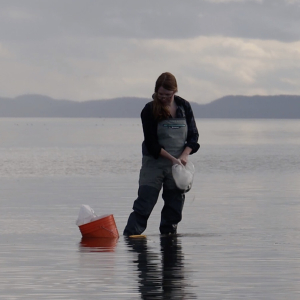
Old Ways New Waves
I'm Coreen Forbes and I'm a PhD candidate here at the Biodiversity Research Centre, in Mary O'Connor's lab. My research focuses mainly on the patterns of benthic diversity of marine invertebrates along the coast of British Columbia
Read about my research.
There's a whole bunch of different species that live in eelgrass meadows. One of the most important groups is copepods and that's where Al Lewis comes in. Al Lewis is an absolute treasure of the Biodiversity Research Centre. He's one of the world's foremost experts on copepod biodiversity.
Copepods are the most abundant organism in the ocean. In contrast to what some entomologists think, we think they're the most common organism in the world. They come in a variety of sizes and shapes and they do a whole host of different things.
Ecology is a really interesting field because the actual methods we use to collect our data, the boots and buckets methods on the ground, hasn't changed for a long time. Collecting is the basis for our understanding – if we don't collect we do not have the data or the organisms to look at. It's absolutely crtical for a scientist or a person working in a museum to have an adequate collection to be able to study the organisms.
While some aspects of ecology have always stayed the same others are changing very rapidly. These species are incredibly difficult to identify just by looking because they have very obscure features. Nowadays, DNA barcoding allows you to take a snippet of DNA and connect that 'barcode' to the wealth of natural history knowledge that has accumulated over the last few decades.